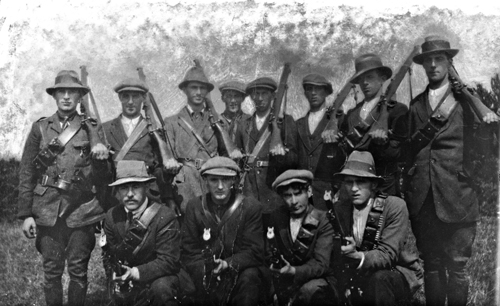Will surrender of arms issue scupper prospects of civil war peace?
Dublin, 10 May 1923 - Efforts to secure an end to the civil war have intensified but considerable differences remain as to how it might be achieved.
While the principle of majority rule is accepted on both sides of the divide, the Government's insistence that all lethal weapons be placed in the effective control of the Government responsible to the people is not. It is only by acceptance of both of these key principles and following practical compliance on the surrender of arms that the Government plans to contemplate the release of individual prisoners.
In a letter issued to Senators Andrew Jameson and James Douglas, who have acted as go-betweens to pro and anti-treaty political leaders, Mr. de Valera said that while he had ‘generously embraced every principle of National value’ that he understood his opponents to be fighting for, he had been met by a ‘rigid insistence on a condition in a form which is well-known by everyone conversant with the situation to be impracticable.’
The Dáil was yesterday informed of a series of developments that have followed from Mr. de Valera’s statement of principles on April 27th where he expressed a readiness to negotiate an immediate cessation of hostilities and the accompanying announcement that a cessation of offensive operations by anti-treaty forces would take effect from April 30th.
Dr. Anne Dolan – Lecturer in modern Irish history TCD will speak about the nature and legacy of the Irish civil war. The consequence of violence at a political and at a personal level and in placing the Irish experience in a wider context
On that very day, Mr. de Valera requested that Senators Andrew Jameson and James Douglas meet him and discuss proposals for peace at which he conveyed his request for a conference on peace. This was declined by President W.T. Cosgrave on May 2nd , who instead asked the two Senators to lay before Mr. de Valera a document setting out the terms on which peace could be arranged.
The terms set out were as follows:
‘All political action within the country should be based on a recognition by every party in the State of the following principles of order:—’
(a)That all political issues whether now existing or in the future arising shall be decided by the majority vote of the elected representatives of the people: (b)As a corollary to (a) that the people are entitled to have all lethal weapons within the country in the effective custody or control of the Executive Government responsible to the people through their representatives. The acceptance of these principles and practical compliance with (b) by the surrender of arms to be the preliminary condition for the release of prisoners who shall be required to subscribe individually to (a) and (b).
Mr. de Valera responded with what Mr. Cosgrave has described as a ‘ long and wordy document inviting debate where none is possible.’
Mr. de Valera’s document has proposed, among other things, that pending a general election Republican forces would be assigned:
‘at least one suitable building in each province, to be used by them as barracks and arsenals, where Republican arms shall be stored, sealed up, and defended by a specially pledged Republican guard—these arms to be disposed of after the elections by re-issue to their present holders.’
It also set out that in the awarding of compensation for losses during the Anglo-Irish war that no discrimination be shown towards those fighting on the republican side of the current conflict and that ‘funds of the Republic, subscribed in the U.S. and elsewhere, and at present sealed up by Injunction, shall be made available immediately for peaceful efforts in support of the Republican cause, and that all property of the Republican party seized by F.S. forces shall be restored.’
[Editor's note: This is an article from Century Ireland, a fortnightly online newspaper, written from the perspective of a journalist 100 years ago, based on news reports of the time.]





















